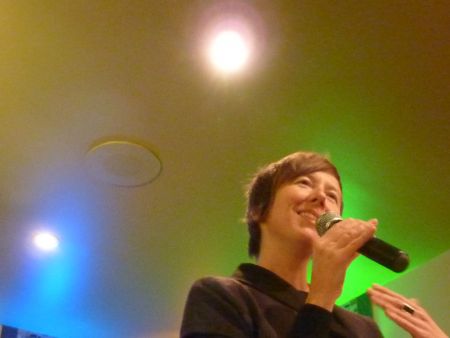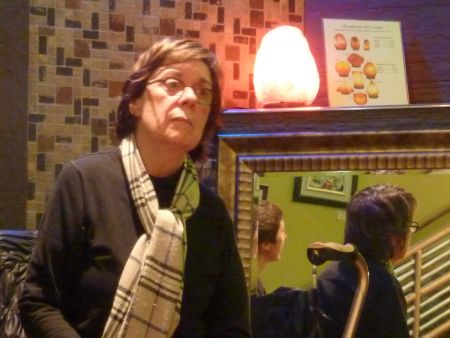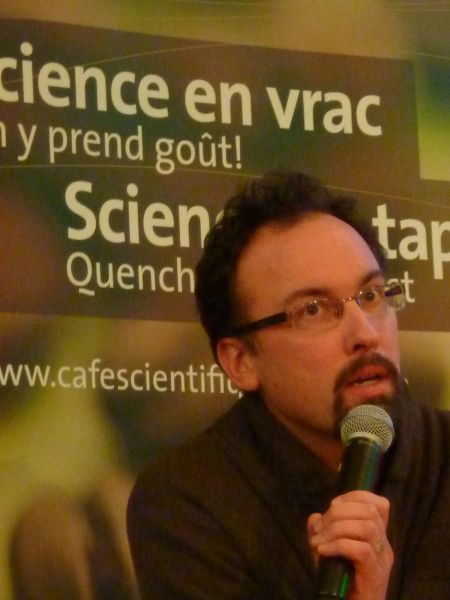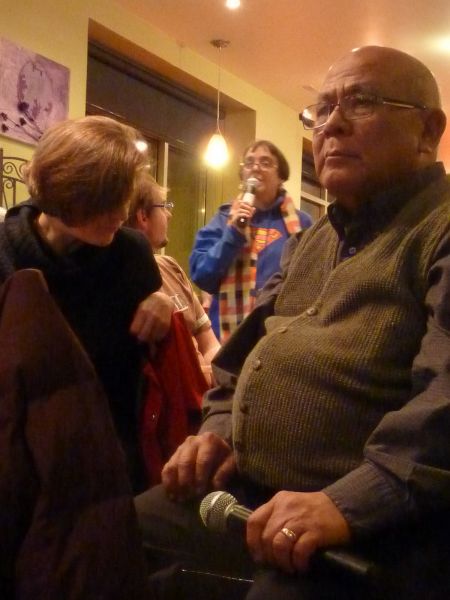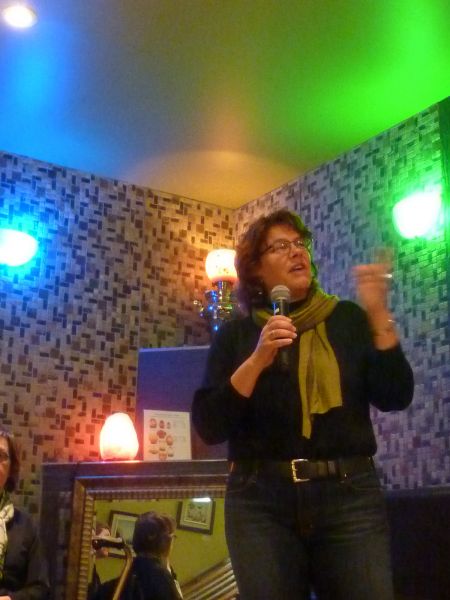HALIFAX--The pain and stigma that often accompanies mental illness affects everybody – even those who operate under the label "normal" – was a recurrent theme during a discussion among 85 people who gathered at Humani-T cafe in Halifax this evening.Traditionally, there is a heavy onus upon those with mental illness to conform to their society, but, we might ask, what adjustments can or should be made by society itself and by those who otherwise identify as "normal"?
"Can you help me?" asked Brenda, an audience member, during the question-and-answer period, turning around to someone behind her.
She changed her mind. "No, I don't need help. I'm tough.
"No, I'm not.
"Yes, I am."
How do we accept and manage those various parts of ourselves that we might want to keep private – being gay, going bald, being shy, having a mental illness? Not all by ourselves, suggested the group. Healthy communities are those in which such differences do not lead to isolation and loneliness – the exacerbation of mental illness.
"Not Well Enough Alone: Mental Illness and Isolation" was the topic of the evening's "Café Scientifique," an event sponsored by the Canadian Institute of Health Research with a mandate to engage the public with current health science research. The evening began with discussions about loneliness, solitary confinement and social isolation.
Brenda told such a story, which went back to when she was seven years old.
"I wasn't wanted. You know that. I knew my place very well. 'You' – that's me – 'go on the side of the house.' I was seven. I was not wanted in the family picture. I wasn't supposed to remember that," she said about the incident. "I'm not blaming anybody. That's life."
Expression of isolation is crucial in helping people with mental illness build self-confidence and to feel that they're not alone, said Andrew Starzomski, a psychologist at East Coast Forensic Hospital in Dartmouth. Symptoms are difficult to share, but hiding mental illness only further isolates those suffering its negative effects. In addition to medical intervention, then, peer support, often found in the form of community groups, is paramount to mental health, even though, said Starzomski, "Studying loneliness is not at the top of the list for research funding, unfortunately."
Susan Bryson, professor of Pediatrics and Psychology at Dalhousie University, works in the prevention of social isolation that results from mental disorders, especially the autism spectrum. She is no stranger to self-concealment. "As you can all see, I had a stroke a year ago," she said. "I'm lucky that I work in a university where people are relatively tolerant of differences."
Not everyone enjoys such tollerance, she said, describing how difficult it is to find employment once a person becomes part of the mental health system.
"This is the biggest problem in our field. One young man went for 30 interviews, and he got not one job offer. He didn't say that he had a developmental disorder, but people could see that something was different, so they didn't want to hire him." Bryson wondered if things might have turned out differently if the young man had simply stated that he had autism.
Bryson challenged the audience to think about reorienting the paradigm that those with mental disorders ought to be shaped to fit in as best as possible to "the rest" of society.
"That [way of thinking] takes the problem away from 'the rest' of us," she said. "Autism wouldn't be a problem in a society that accepted it. But instead of taking that social responsibility, we make the victims victims. The problem is not the language disorder or the social impairment, but the social isolation from our lack of acceptance of people with autism. The isolation, in turn, puts people with Autism at risk of other mental illnesses."
Lisa Guenther, assistant professor of Philosophy at Vanderbilt University in Nashville, asked the audience to think about the extreme – and state-sponsored – social isolation experienced by those in the prison system, and specifically, those in solitary confinement.
"To understand the effects of solitary confinement, we need to press against our definition of 'mental illness,'" she said. "Is it an individual mind? Or is it a question of the social whole within which we understand each other?"
Guenther described what happens to people in solitary confinement. They lose the ability to clearly perceive the world; physical objects begin to lose form, their physical boundaries begin to waver. What is a hallucination and what is real becomes unclear. They suffer stomach aches, headaches, anxiety, nervous tension, paranoia, and develop mental, emotional, physical and cognitive disorders.
"They experience an inability to [mentally] move on from an issue because no-one is there to confirm that something happened, or didn't happen," she said.
Kaley Kennedy, a Halifax activist and prisoner solidarity worker, reminded the group that this social isolation and mental illness perpetuated by the prison system is only going to get worse in the context of Harper's Omnibus Crime Bill, which critics believe will lead to mass incarceration. The bill is supported tacitly, she said, by society's belief that "some people deserve to go to prison."
Guenther agreed, saying, "Punishment and rehabilitation is a double edge. We want people to pay for their crime, but also to rehabilitate." She acknowledged that some people do take advantage of their time in prison to set their lives in order.
Another audience member described the life experiences of her son, who was recently diagnosed with autism.
"He landed in the criminal system," she said. "In jail, he hears voices. He gets assaulted. The guards know how to manipulate him. They give him his medication, tell him to put the pill under his tongue, and then half an hour later make him give it back, or risk being assaulted. He has learned to say that he is going to commit suicide to be put on suicide watch, to avoid the abuse."
People with autism landing in jail worries Bryson deeply.
"They're innocent," she said. "They don't perceive the malicious intentions of others. They understand physical cause and effect, not psychological cause and effect." Being incarcerated, she said, is a dangerous place for such a person.
Starzomski said the same cookie-cutter approach is sometimes taken with people in mental health institutions.
"It can be hard to appreciate that you might not know the right way [to treat mental illness]. Systems and professionals have a hard time being flexible – letting go of [their] agenda of what the patient needs – be more fully connected to the patient and the direction they want to go."
Reorienting ourselves to our relationships with people with mental illness "needs to be part of the education system from early on," said Bryson. "I once worked with a five-year-old who liked a girl with a severe language disorder. The little boy didn't care--he liked her! But between the ages of five and 10, something happens." We learn not to like the little girl anymore.
"Do we treat all people well," she asked, "or are we in fact highly selective?"
What if, asked an audience member, we encouraged everyone to explore their hidden corners, to experience the kind of isolation that goes along with those private bits of ourselves, to be challenged to reestablish our own realities?
"If we can open the otherness of ourselves to ourselves," said Guenther, "then as a community we can develop an interconnectedness with others."
photos by Moira Peters
